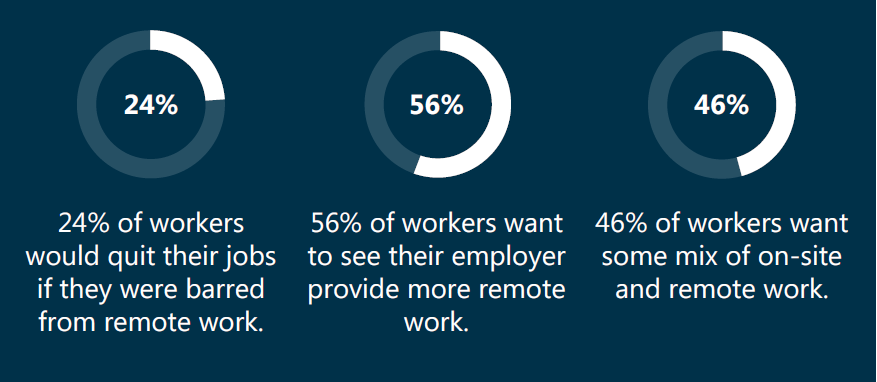Understanding The Difference Between RSV, Flu and COVID-19
This article is from RISQ Consulting’s Zywave client portal, a resource available to all RISQ Consulting clients. Please contact your Benefits Consultant or Account Executive for more information or for help setting up your own login.

Health experts warn of a “tripledemic” surge this winter as Americans face the threat of severe respiratory syncytial virus (RSV), influenza (flu) and COVID-19. In the last couple of years, both the flu and COVID-19 have been prominent in the United States, but with the addition of RSV’s prevalence this year, there are new risks when catching any of these illnesses. The Centers for Disease Control and Prevention’s (CDC) surveillance has shown an increase in RSV detections and RSV-associated emergency department visits and hospitalizations in multiple U.S. regions.
With several viruses circulating this winter, you may worry about every cough or sneeze and wonder what you have. Since these illnesses are all caused by viruses that affect your respiratory system, they also share some symptoms. This can make it challenging to know what you may be sick with when feeling under the weather. This article highlights the differences between RSV, flu and COVID-19 based on CDC information.
RSV
RSV is a common respiratory virus that usually causes mild, cold-like symptoms. Almost all children will have had an RSV infection by their second birthday. Most people recover in a week or two, but RSV can be serious, especially for infants and older adults. RSV tends to spread via surface droplets, especially high-touch areas.
RSV symptoms can appear within four to six days after getting infected. Common symptoms include:
- A runny nose
- Decreased appetite
- Fever
- Cough
- Sneezing
- Wheezing
These symptoms usually appear in stages—not all at once. Very young infants with RSV may only experience symptoms like irritability, decreased activity and breathing difficulties.
Flu
Flu activity typically peaks between December and February, although significant activity can last as late as May. Since the COVID-19 pandemic began, flu activity timing and duration have been less predictable.
Flu symptoms usually come on suddenly and vigorously and are more severe than a cold. Common symptoms include:
- High-grade fever or chills
- Cough
- Sore throat
- Runny or stuffy nose
- Muscle or body aches
- Headache
- Fatigue
People with the flu often feel some or all of the above symptoms. Most people who get the flu will recover in a few days to less than two weeks, but some will develop a wide range of complications because of the flu. For example, sinus and ear infections are moderate complications, while pneumonia is serious.
COVID-19
COVID-19 spreads when an infected person breathes out droplets and tiny particles that contain the virus. These droplets and particles can be breathed in by others or land on their eyes, noses or mouth.
Symptoms can appear two to 14 days following exposure to COVID-19. Anyone can have mild to severe symptoms. Common symptoms include:
- Fever or chills
- Cough
- Shortness of breath or difficulty breathing
- Fatigue
- Muscle or body aches
- Headache
- New loss of taste or smell
- Sore throat
- Congestion or runny nose
- Diarrhea
This list doesn’t include all possible symptoms because symptoms may change as new COVID-19 variants emerge and can vary depending on a person’s vaccination status. As such, the CDC recommends COVID-19 vaccines for everyone 6 months and older and boosters for everyone 5 years and older.
Summary
Because there is some overlap between symptoms, it may be difficult to determine whether you have RSV, the flu or COVID-19 without being tested. For more information about these viruses, visit the CDC’s website.
If you’re not feeling well, stay home and call your doctor to explain your symptoms or take an at-home COVID-19 test, if available. A health care provider can also test to determine if you have RSV, the flu or COVID-19.
- Published in Blog
The Great Reconsideration: Looking Ahead to the Next Stage of the Labor Market
This article is from RISQ Consulting’s Zywave client portal, a resource available to all RISQ Consulting clients. Please contact your Benefits Consultant or Account Executive for more information or for help setting up your own login.
The labor market continues to be unpredictable and driven by new challenges. As such, economists have signaled that the labor market is moving into another phase. Previously, there have been trends labeled as the Great Resignation and the Great Reshuffle. The Great Resignation referred to a mass movement of workers leaving the workforce. In contrast, the Great Reshuffle illustrated workers quitting one job they are unsatisfied with to take another—which has been a more accurate assessment. There has not been a mass exodus from work itself, as the term the Great Resignation suggested. While these terms still hold some truth to the current state of the market, some economists have even used a new term to describe the current worker sentiment: the Great Reconsideration. Instead, workers are seizing the unprecedented opportunity to reconsider and change their work experiences. They’ve had time to reflect on their jobs and consider opportunities with a fresh perspective.
This article examines the current labor market, highlights driving trends and offers tips for employers navigating the market.
Market Overview
The most recent U.S. Bureau of Labor Statistics (BLS) report revealed that the number of job openings rose to 11.2 million in July. This number was well above the estimate and still outnumbered unemployed workers by about 5.5 million. The July BLS numbers reinforced that there is still a considerable shortage of workers for available positions, with openings outnumbering available workers by a nearly 2-to-1 margin.
Employee quits, a top worker confidence metric, dropped from a record-high 4.53 million in March to 4.18 million at the end of July. The report also revealed that the employee quit rate declined one tenth of a percentage point to 2.7%. Nonetheless, this number is still relatively high by historical standards.
Additionally, the unemployment rate has not yet reached pre-pandemic levels. In July, the rate sat at 3.7%. In a regular labor market, this could be a troubling sign; however, it indicates that the job market could be on its way to normalizing. From a retention and attraction perspective, these numbers further illustrate that it’s a worker-friendly market.
The struggle to fill positions and related challenges have increased labor costs for employers as they raise wages and offer competitive benefits and other perks to attract talent. The market trends also demonstrate that workers remain confident enough to switch jobs for better pay and working conditions despite economic pressures like inflation.
Driving Trends
The COVID-19 pandemic undoubtedly shifted the playing field for workers and organizations. Now, amid the Great Reconsideration, both parties are reevaluating various aspects of the workplace and the workday.
Many employers are reassessing what workplace accommodations or transformations have—or have not— worked and what can be done to improve employee engagement and satisfaction. Simultaneously, workers are reconsidering their career goals and expectations for an employer.
Hybrid Work
Hybrid work continues to be a catalyst for modern workplace challenges. As such, more on-site workers want to leave their jobs than remote workers, according to a survey from professional services network KPMG. Consider the following additional statistics:

Many workers desire a hybrid workplace model to have more face-to-face time with their co-workers. The camaraderie with colleagues is a top reason why workers want to be in the office or similar settings part-time. Other motivators include creating a work-life balance, getting out of the house or benefiting from a regular change of environment. In the end, workers are looking for solid and united company cultures—and employers have an opportunity to act on this desire as they reconsider their workplace expectations and strategies. Employers who embrace hybrid work models may see improvements in employee productivity, morale and, most critically, retention.
Long COVID and the Labor Market
Long COVID-19—long-term effects stemming from COVID-19 infection—continues to impact the labor market and employees’ health. The U.S. Census Bureau’s latest Household Pulse Survey found that 16.3 million working-age Americans currently have long COVID. It has been reported that long COVID is even keeping some workers out of employment; an estimated 4 million workers are out of the labor market, according to Brookings Institution’s nonresident senior fellow Katie Bach.
Long COVID can pose serious risks for employers, including decreased productivity and the loss of employees from the workforce entirely. Therefore, they must stay up to date on trends surrounding the condition’s rates and other related topics, such as strategies other employers are using to respond to long COVID.
Salaries and Job Hopping
HR services provider ADP reported that salaries have been increasing rapidly, nearly on par with inflation. Annual pay raises rose by 7.6% in the period leading up to August 2022, compared to an average of 2% in early 2021. However, the most significant raises went to job hoppers. Those who found different jobs experienced salary gains of 16.1%, while employees who stayed loyal to a company received an average increase of 7.6%.
Looming Recession
As the Federal Reserve struggles to tame skyrocketing prices, employers and employees alike are worried about entering a recession. Some might even say a recession has already begun. The reality for many business owners due to the employment market is slower growth and rising labor costs. As a result, many organizations have experienced or are planning layoffs and hiring freezes in the back half of this year.
What Are Employers Doing?
Although the Great Reconsideration is currently taking place, new labor challenges will likely surface. All employers can do is face the moment and put together a game plan. As a thought-starter, here are strategies some organizations are using to win over talent:
- Review compensation. As employers and employees continue to be hit by inflation, organizations should start reviewing and assessing their current compensation and benefits. It could be helpful to analyze pay raises from similar companies based on industry or geographic location.
- Reimagine company culture. Just as workers are reconsidering what they want for work and an employer, an organization can reevaluate its goals and what kind of employer they want to be. Company culture can be an organization’s best protection against losing employees—and offer a leg up on attracting new employees. There is usually a gap between organizational leadership and what employees experience, so there’s a need to keep it aspirational but realistic.
- Rethink perks. Flexibility is no longer a generous workplace perk. It’s a significant perk, but many employees already have a flexible working schedule or expect it from prospective employers. With remote or hybrid work becoming table stakes, employers will have to stand out against the competition with other unique perks (e.g., four-day workweek and flexible hours).
- Prioritize real-time over real-life connections. Workplace connection has often been thought of as something that happens during the workday in the hallway, at the coffee station or in other communal areas. However, employers can still plan for real-life connections without requiring employees to be working on-site all day. This can be achieved by making real-time communication a habit for employees by providing tools, opportunities and encouragement to connect. Employers are considering ways to create intentional spaces for peer connection that don’t necessarily involve day-to-day work.
- Invest in career growth. With many workers reevaluating their career goals and paths, employers can invest in workers by expanding learning and development opportunities. Employers can enhance their staffing and worker skill levels by offering employees a chance to enrich their careers via upward mobility. Forward-thinking organizations will plan to recruit and retain employees for the skills needed today—and in the future.
In the end, many employers are reinventing their company culture to account for adjusted organizational mission and values, company culture and employee expectations.
Summary
Generally, job openings remain high as the demand for workers outweighs the supply. Many employers are at a disadvantage and struggling to fill positions. Unfortunately, experts expect talent challenges to continue. Yet, forward-thinking organizations are benefiting when they remember that workers are human. Workers are looking for an employer who matches their style, needs and beliefs. They want to work where they feel care and support from their employers. As the Great Reconsideration is in progress, employers will have to find ways to make their culture and workplaces look and feel authentic and reliable. Employers should continue to monitor employment trends in the evolving market to stay competitive. Contact us for more resources.
- Published in Blog
We’ve Gone Soft on Soft Skills
By Jennifer Outcelt, Creative Content Architect
Covid gets a lot of the blame for everything we don’t like about our current society. While no one could claim Covid as beneficial without first being berated for such a callous insinuation, perhaps Covid does deserve a few props for exposing some existing societal gaps that might have otherwise snuck under the radar. I’m talking about the dwindling emphasis on soft skills in the classroom.
This week my father sent me a link to the article, COVID has revealed the soft skills gap among America’s youth: It’s time we address it. The context of this article within his email was regarding his pride for how I turned out as a working adult and how he believed my mastery of these endangered soft skills were directly correlated with my successes. After reading the article I immediately felt a terrible sadness for the upcoming generations. My dad was right; honing soft skills were a huge part of my schooling and extracurricular actives. Without that emphasis I’m not sure I would have carried myself as far as I have.
Please don’t read my above statement as synonymous with the stereotypical sentiment of the elderly that, (to be read in a wilting aged voice) “this generation of young whippersnappers is inferior compared to my generation!” Indeed, I do not hold this belief. Each new generation builds forward from the hard work and sacrifices of the previous one and deserves to create a world that belongs to them. As our societies evolve, so do our perceptions of what is important. Many of these changes can be justified, yet some can be detrimental. We may not realize which is which until it’s too late.
Sometimes technology renders previously important skills obsolete for the majority of people. For example, darning socks. What used to be a necessary skill for the upkeep of a scarce commodity, is now relatively unnecessary based on convenient and cheap access to new socks.
What technology will not take away is the need for leadership, interpersonal communication, empathy, time management, and creative thinking skills. Unfortunately, these are not formally taught skills in the public school curriculum. These skills are fostered in extracurricular activities like sports, debate, theatre, JROTC, Odyssey of the Mind, scouts, and any other program that brings together a group of youths to accomplish common goals. The pandemic (and let’s face it, a bit of laziness on societies part as a whole) has taken away these extracurricular activities and rendered millions of children deficient in these soft, yet invaluable, skills.
Check out this article to read more about why this has happened and what toll it could take on our future.
https://www.foxnews.com/opinion/covid-revealed-soft-skills-gap
- Published in Blog
How to Get Your Free At-home COVID-19 Test
This article is from RISQ Consulting’s Zywave client portal, a resource available to all RISQ Consulting clients. Please contact your Benefits Consultant or Account Executive for more information or for help setting up your own login.
If you participate in a health plan—through your employer or otherwise—you are likely eligible for free, over-the-counter COVID-19 tests for home use. Depending on your plan, your COVID-19 tests will be paid for directly by insurance, or you will be reimbursed later for the cost. The human resources (HR) department will be able to tell you which applies to you. Keep reading to learn more about this cost-saving opportunity.
Up to what price is covered?
In many instances, insurance companies are only required to reimburse you at a rate of up to $12 per individual test (or the cost of the test if it’s less than $12). This is typically the case when your insurance company has specific locations they want you to get your test from. However, if your insurance company doesn’t specify where you may get a COVID-19 test, you may be able to be reimbursed for your full test cost, even if it exceeds $12. In all cases, keep your receipts! Speak with your HR department to learn more about your plan’s cost limits and preferred purchasing locations.
Do I need to purchase the test at a certain location for it to be free?
Your employer may have specific locations (e.g., pharmacies) where you can pick up a free test that is paid for directly by your insurance. Your HR department will be able to tell you. However, you can also purchase a COVID-19 test from anywhere you like (i.e., online or in-person at a store) and still be reimbursed up to $12 for the test (or more, depending on your plan). Be sure to keep your receipts in order to be reimbursed.
How will I be reimbursed for my test?
If you need to be reimbursed for a COVID-19 test (i.e., it was not free at the point of sale), keep your receipts. Then, reach out to your HR department —they will be able to tell you how to submit the receipt for reimbursement from your insurance company.
How long will reimbursement take?
Reimbursement is typically prompt, but it may vary. Your HR department will be able to provide a more accurate time estimate.
What if I cannot afford to pay for a test upfront and wait for reimbursement?
There are a number of low- or no-cost COVID-19 testing options. You can find community-based testing sites here. Alternatively, COVID-19 tests are also available without cost sharing or limitations to covered individuals when administered by a health care provider (e.g., a nurse, doctor or pharmacist).
Can I be reimbursed for past COVID-19 tests I purchased?
Insurance companies are only obligated to reimburse you for COVID-19 tests purchased on or after Jan. 15, 2022. Any tests bought before then are not covered. However, while the answer will generally be no, you still can speak with your plan sponsor about potential reimbursement for COVID-19 tests you bought previously.
Is there a limit on the number of tests I can be reimbursed for?
Your plan is required to provide reimbursement for eight tests per month, regardless of whether the tests are bought all at once or at separate times throughout the month.
My workplace requires weekly COVID-19 testing. Can I be reimbursed for these tests?
Plans are not required to provide coverage for testing (including at-home COVID-19 tests) that is for employment purposes. Speak with your HR department to learn more about ’s testing requirements and your potential related costs.
Where can I learn more?
If you have any questions about the information in this article, reach out to your HR department.
- Published in Blog
EPLI Claims on the Rise
This article is from RISQ Consulting’s Zywave client portal, a resource available to all RISQ Consulting clients. Please contact your Benefits Consultant or Account Executive for more information or for help setting up your own login.
As COVID-19 vaccination rates increase and transmission rates of the virus decrease, employment practices liability insurance (EPLI) claims involving retaliation are expected to continue to increase as employees return to the workplace. Data from the Equal Employment Opportunity Commission (EEOC) shows that EPLI claims alleging retaliation have increased every year since 2003, with 37,632 workplace retaliation claims filed in 2020. The claims are typically filed in conjunction with discrimination or wrongful termination allegations.
The EEOC anticipates a rise in whistleblower claims from employees bringing forward concerns about health and safety in the workplace. Such claims may include employees concerned about exposure to COVID-19 due to unsafe working conditions or situations where employees allege they were wrongfully denied a request for leave or workplace accommodation.
The cost to defend and settle retaliation lawsuits has increased considerably in recent years, and the EEOC doesn’t anticipate that trend slowing down. With more workers bringing forth COVID-19-related legal actions, businesses are eager to purchase EPLI policies. However, the shift in the market has resulted in higher policy retentions, premium increases and new exclusions specific to COVID-19 exposures, and EPL insurers have started scaling back coverage.
Businesses can be proactive in mitigating EPL claims by:
- Distributing an employee handbook—The handbook should contain the company’s equal employment opportunity policy and provide employees with steps for reporting discrimination or harassment.
- Developing a code of ethics policy—Avoid ethical violations by developing and implementing a code of ethics and sharing it with all employees. This can help reduce an employer’s exposure to punitive damages.
- Instituting handbook auditing procedures—Keep the handbook up to date on the latest law changes by having an audit procedure in place.
As employees return to the office, employers should review their EPL coverage and take proper precautions to avoid EPL claims. For more information on EPLI, contact us today.
Remote Employees More Isolated Than Ever
As the world enters the third year of the COVID-19 pandemic, remote employees feel more isolated than ever. According to a survey from One Poll and Volley, 7 out of 10 employees who work from home report feeling increasingly isolated after more than a year out of the office. Two-thirds of respondents also report feeling disconnected from their teams, with a similar percentage reporting they work directly with someone they could not pick out of a lineup.
Loneliness can result in poor mental health outcomes, such as depression or anxiety. Employers should be concerned that isolation can lead to increased stress levels and poor decision-making, both of which can hurt business. However, it can be difficult to detect symptoms of isolation.
To better thrive in remote work situations, employers should encourage employees to:
- Reach out to coworkers. Utilizing video and audio calls throughout the week to communicate and brainstorm with coworkers can increase feelings of collaboration and inclusion. It can also help teams communicate more effectively and avoid misunderstandings.
- Work outside the house once a week. As more COVID-19 vaccinations are administered and restrictions are lifted, it can be helpful to work outside the home at least one day per week. A library, café or co-working space can help fight feelings of isolation.
- Go outside for lunch. Taking a break and enjoying a nice walk during lunch can help bring fresh energy back to work. Making time for movement outside or inside can help boost endorphins.
- Make plans for after work. Schedule time with friends and family after work to feel less lonely. Having plans can also ensure employees don’t overwork or get burnt out.
Employers should be proactive in reducing feelings of loneliness and isolation in remote workers to improve morale and business outcomes. For more information, contact us today.
- Published in Blog
What President Biden’s Vaccine Mandate Means for Employers
This article is from RISQ Consulting’s Zywave client portal, a resource available to all RISQ Consulting clients. Please contact your Benefits Consultant or Account Executive for more information or for help setting up your own login.
President Joe Biden’s administration is continuing its efforts to curb the COVID-19 pandemic and the spread of the deadly coronavirus Delta variant. Recently, the White House ordered all federal workers and contractors to get vaccinated against COVID-19. Now, the government is imposing a similar requirement on private employers. The move is estimated to affect over 80 million private-sector workers.
The Occupational Safety and Health Administration (OSHA) has been tasked with drafting an emergency temporary standard (ETS) and will announce more specifics in the coming weeks. Soon, employers with 100 or more employees will need to adapt their vaccine policies to comply with these new rules.
This article discusses this latest vaccination mandate, including its scope and how it may affect employers.
Note: This is a developing issue. Information will be updated here and in subsequent resources as more details are released.
Rule Overview
Soon, employers with 100 or more employees (measured companywide, not by location) will need to enforce one of the following:
- Require employees to get vaccinated against COVID-19
- Require unvaccinated employees to produce evidence of a negative COVID-19 test each week
This flexibility allows employers to choose how strictly they want to enforce a vaccine mandate. In other words, some employers may decide to make vaccination a condition of employment; others may only require negative COVID-19 tests.
What’s Known About the Upcoming Rule
OSHA is tasked with drafting the new rule. As such, there will be few details available before OSHA publishes a definitive ETS. Meanwhile, the only pertinent information has come from short government briefings.
Here’s what’s known about the upcoming rule, keeping in mind these particulars may change in time:
- The rule will only apply to employers with 100 or more employees, measured companywide.
- Employers will be able to decide if they want to adopt a strict, mandatory vaccination policy or allow testing as an alternative.
- Employers must provide paid leave to receive and recover from vaccinations.
- Remote employees not working in contact with others will be exempt from the ETS (unless they come into the workplace).
Again, all aspects of this upcoming rule are subject to modification as OSHA continues to work on the details. The above information is provided to help employers understand how the government is proceeding in this area.
What’s Unknown About the Upcoming Rule
Much is still unknown about the upcoming vaccine requirement, and it will remain as such until OSHA publishes the ETS. Here are just some of the questions that remain to be answered:
- When will the ETS begin being enforced?
- What qualifies as proof of vaccination or a negative COVID-19 test?
- Who must pay for weekly testing?
- What specific penalties will there be for noncompliance?
- Will the mandates apply to part-time workers?
- Will there be new guidance on how employers should handle accommodations for employees seeking an exemption?
- Must paid leave be provided for employees’ COVID-19 testing, as it is for vaccinations?
As the list illustrates, there are many unknown factors at this time. Employers will need to stay tuned for updates from OSHA as they come; however, that employers can take action in the meantime.
Expected Enforcement Timetable
The vaccination mandate will come in two primary waves:
- An ETS with comprehensive details and actionable steps
- A permanent OSHA standard with all aspects fleshed out
First, OSHA will publish its ETS that will include important details and enforcement guidelines. This is expected to come in the weeks ahead; however, an actual release date is uncertain. Once issued, the ETS will take immediate effect in states where federal OSHA has jurisdiction. In states where the federal government does not have jurisdiction over workplace safety, state agencies will have to either adopt the ETS or develop their own ETS within 30 days that is “at least as effective.”
An ETS can only remain in effect for six months. After that time, it must be replaced by a permanent standard, which must undergo a formal rule-making process involving a notice-and-comment period to allow stakeholders to submit feedback. This process follows the usual procedure for adopting a permanent standard except that a final ruling should be made within six months from that date OSHA publishes the ETS in the Federal Register.
In summation, employers can expect the ETS sometime within the year, but its specifics may ultimately change as the standard is finalized.
What Employers Can Do Now
While many details are still unknown, the primary vaccination or testing requirement is definite. As such, employers can at least prepare for this aspect of the mandate. Here are some actions employers can consider when preparing for the upcoming requirement:
- Determine whether COVID-19 vaccination will be required as a condition of employment or if weekly negative testing will be an alternative.
- Consider how to handle accommodation requests for those seeking vaccination exemptions.
- Start planning an employee communication campaign to educate workers about vaccine policy changes.
- Think about the systems needed to adequately track employee vaccination statuses and confidentially secure the data.
- Plan for potential staffing shortages or scheduling changes to afford employees time to get vaccinated.
- Consider whether partitions or spaced-out workstations will be utilized
This list is nonexhaustive, as certain considerations will be unique to individual employers.
Though the ETS will almost certainly face multiple legal challenges, employers should not count on the rule being entirely struck down and should begin preparing to comply as soon as possible.
Conclusion
The specifics of this latest vaccine mandate are still being drafted, so its rules may seem like a distant concern; however, these requirements will take effect quickly once they’re announced. Employers will need to act swiftly when the time comes to ensure compliance. Taking proactive steps now can help save employers from a scramble at the end of the year.
Reach out to RISQ Consulting to discuss how this new rule may affect your business. In the meantime, stay tuned for updates as this situation develops.
- Published in Blog







